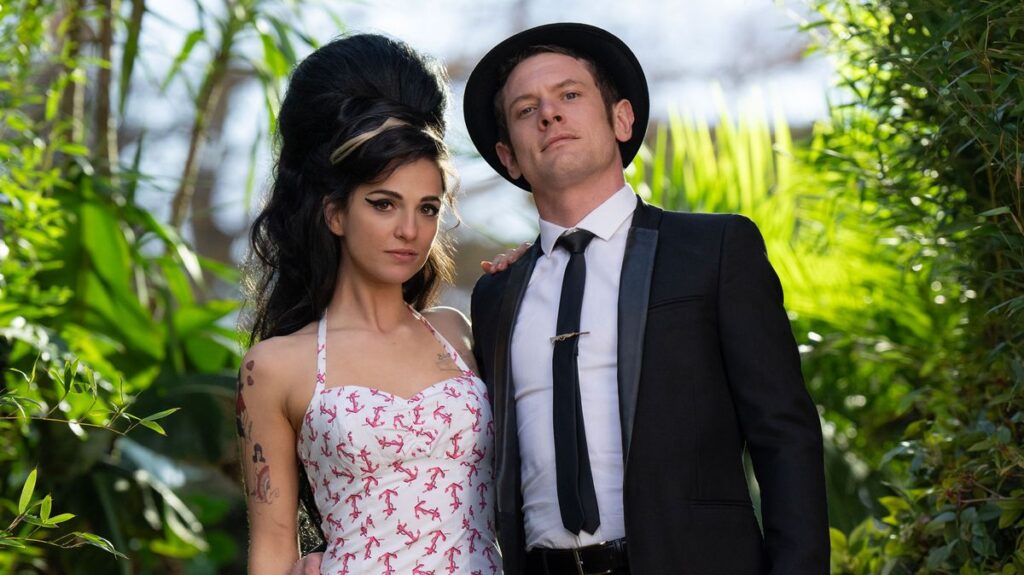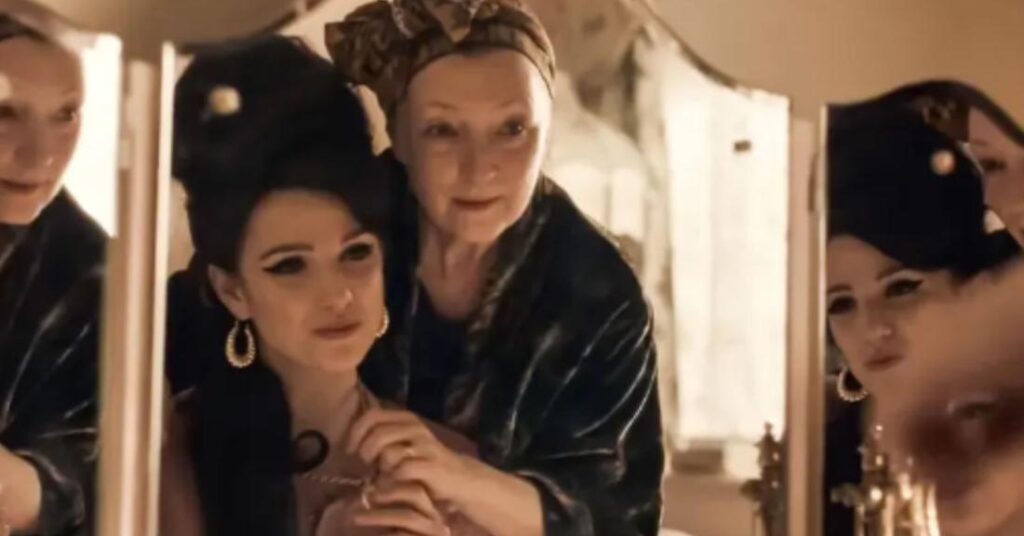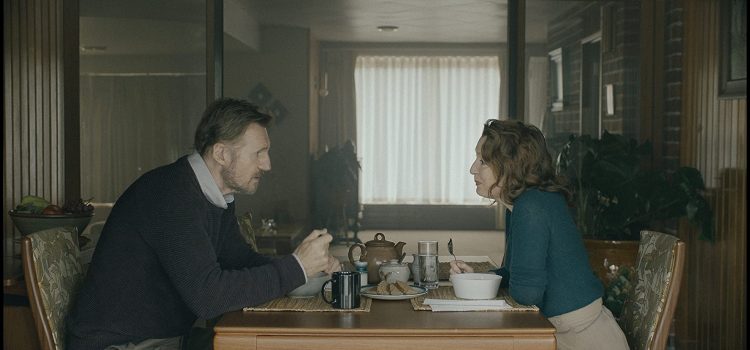By Alex McPherson
Featuring excellent performances from Marisa Abela and Jack O’Connell, but otherwise coming across as a surface-level retelling of singer Amy Winehouse’s tumultuous rise and fall, director Sam Taylor-Johnson’s “Back to Black” ultimately does little to justify its existence.
Taylor-Johnson’s film, which has the support of the Winehouse estate (unlike Asif Kapadia’s superior 2015 documentary “Amy”), is less an honest portrayal of the performer’s tragically short life than it is an attempt to rewrite history. It smooths over well-documented truths and packages them into rote drama that sacrifices nuance for miserablism.
“Back to Black” begins in Camden Town, London, in 2002, where the 18-year-old Winehouse – a rebellious, wry soul with a love of jazz – is a burgeoning talent, channeling old-school sounds to modern audiences and using music to express herself in the face of life’s challenges.
Her divorced parents Janis (Juliet Cowan, who gets a notably small amount of screen time) and Mitch (Eddie Marsan) recognize Amy’s undeniable skill, as does her loving grandmother Cynthia (a typically comforting Lesley Manville), who encourages her to pursue a music career. Before long, Amy does, thanks to her future band manager Nick Shymansky (Sam Buchanan) but, as Matt Greenhalgh’s screenplay smugly foreshadows, her downfall will soon follow.
Funny, passionate, and strong-willed, with a distinctive 50’s-60’s inspired style to boot, yet also an emotionally unstable, bulimic alcoholic, Amy is a force to be reckoned with – even though Taylor-Johnson neglects to give viewers much context into why she is the way she is. She insists to record label suits that she “ain’t no spice girl,” refusing to compromise on her songs and performances.
But when she begins an on-again, off-again relationship with handsome scumbag Blake Fielder-Civil (O’Connell), Amy spirals into further substance abuse and codependency as her stardom rises. It all eventually proves fatal: she’s a victim of fame, drug abuse, and bad actors feigning support while exacerbating her decline.

Addictions and personal life chaos aside, Amy was a one-of-a-kind talent that shouldn’t be reduced to a by-the-numbers biopic treatment. Unfortunately, Taylor-Johnson is not up to the task. What results is a puzzling experience that lacks insight, perspective, and purpose, other than to serve as an acting showcase and an attempt at whitewashing history into sanitized drama for the masses.
At least Abela gives it her all. She captures Amy’s inherent likability, volatility, and inner demons with an authentic attention-to-detail, commanding her every scene even when the script lets her down. Abela does her own singing for the film, too (with the standout being her titular “Back to Black”).
While Amy’s voice is impossible to recreate, Abela does a valiant job nonetheless, in the scattered moments that Taylor-Johnson actually foregrounds the music rather than Amy’s conflicts. Scenes of Amy’s creative process are half-baked – reduced to rushed, solitary brainstorming sessions – but Abela conveys a youthful, exuberant fervor that’s infectious and alluring.
O’Connell, too, is fittingly charismatic. Blake emanates bad boy vibes that Amy is immediately drawn to, despite the fact that Blake has a girlfriend when they begin their flirtation. Abela and O’Connell have great chemistry, and the early stages of their relationship are charming and playful, if tinged with the dark knowledge of the horrors to come.
Still, the film’s rushed pacing makes it difficult to fully buy into their bond – especially since Amy’s impulsive behaviors and attachment issues aren’t given enough context for us to understand where she’s coming from. Since Taylor-Johnson’s film focuses on a “snapshot in time,” primarily the period between the release of Amy’s first album, “Frank,” and the grammy-winning “Back to Black,” we don’t get much insight into her troubled childhood.

This is likely to save face for Mitch, who the film treats gingerly; his well-documented enabling of Amy’s vices and mental health struggles is downplayed, as is the decade during Amy’s youth in which he had an affair and wasn’t present in the household.
Blake is depicted both as a victim and a victimizer – seemingly powerless to resist Amy’s charms, but manipulating her to fuel his own addictions; his unpredictable behaviors do a number on Amy’s fragile psyche as their relationship becomes increasingly public and destructive. But “Back to Black” still posits that Amy introduced herself to heroin – an odd choice on Taylor-Johnson’s part that feeds into the film’s view of Amy as an unavoidable trainwreck, a person who was doomed from the start and who lacks the will to change.
Indeed, Taylor-Johnson characterizes Amy as a hopeless soul experiencing an inevitable decline, a victim of her own heart, rather than foregrounding Amy the artist. The music itself is almost an afterthought, a consequence of Amy’s inner turmoil rather than a genuine expression of her craft, as the film erratically jumps through time to the next big crisis in Amy’s life.
The portrayal of the media storm surrounding Amy, too, is just window-dressing; Taylor-Johnson doesn’t effectively capture the way her music grips the nation or the celebrity pressure that propels Amy further into oblivion, relying on merely workmanlike direction. The film even pulls its punches in the end, letting its troubled “heroine” drift offscreen, as if the film is too scared to depict the depths of her suffering.
For someone who wanted to be known for her music above all else, it’s downright irresponsible to frame her story like this — Taylor-Johnson molds Amy’s trauma into accessible entertainment. With Kapadia’s excellent documentary providing a far more meaningful portrait, “Back to Black” begs the question: why was this biopic necessary?
“Back to Black” is a 2024 biopic directed by Sam Taylor-Johnson and starring Marisa Abela, Jack O’Connell, Eddie Marsan, Lesley Manville and Sam Buchanan. It is rated R for drug use, language throughout, sexual content and nudity, and runtime is 2 hours, 2 minutes. It opened in theatres May 17. Alex’s Grade: C-


Lynn (Zipfel) Venhaus has had a continuous byline in St. Louis metro region publications since 1978. She writes features and news for Belleville News-Democrat and contributes to St. Louis magazine and other publications.
She is a Rotten Tomatoes-approved film critic, currently reviews films for Webster-Kirkwood Times and KTRS Radio, covers entertainment for PopLifeSTL.com and co-hosts podcast PopLifeSTL.com…Presents.
She is a member of Critics Choice Association, where she serves on the women’s and marketing committees; Alliance of Women Film Journalists; and on the board of the St. Louis Film Critics Association. She is a founding and board member of the St. Louis Theater Circle.
She is retired from teaching journalism/media as an adjunct college instructor.


